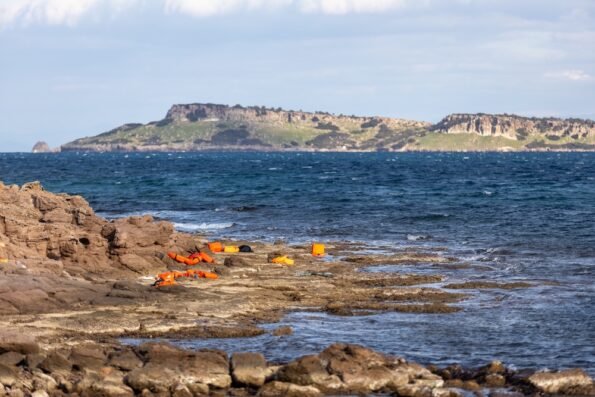Search
To search for an exact match, type the word or phrase you want in quotation marks.
A*DESK has been offering since 2002 contents about criticism and contemporary art. A*DESK has become consolidated thanks to all those who have believed in the project, all those who have followed us, debating, participating and collaborating. Many people have collaborated with A*DESK, and continue to do so. Their efforts, knowledge and belief in the project are what make it grow internationally. At A*DESK we have also generated work for over one hundred professionals in culture, from small collaborations with reviews and classes, to more prolonged and intense collaborations.
At A*DESK we believe in the need for free and universal access to culture and knowledge. We want to carry on being independent, remaining open to more ideas and opinions. If you believe in A*DESK, we need your backing to be able to continue. You can now participate in the project by supporting it. You can choose how much you want to contribute to the project.
You can decide how much you want to bring to the project.

While wars and conflicts in the Middle East, Ukraine, Africa, and other regions force millions of people to leave their homes and become refugees, Europe responds by further closing its borders, which in turn leads to forced returns, shipwrecks, deportations, and racist laws and regulations, both on the part of the European Union and individual countries. It is well known that, for many reasons, the majority of those fleeing war seek refuge in neighboring countries rather than in Europe. For example, while the genocide of the Palestinian people in Gaza continues and Israel’s attacks spread to Lebanon, Syria, Yemen, and elsewhere, or while the civil war in Sudan has displaced, according to the UN, nine million people, no wave of refugees has flooded Europe. Despite this, the alarmist rhetoric of European countries regarding the management of migratory flows and the repetition of the narrative of the so-called “refugee crisis” not only continues unabated but has become increasingly dangerous.
The new Migration Pact, recently approved by EU member states, sweeps away the last vestiges of human rights and dynamites the Geneva Convention for the protection of refugees. Political asylum, understood as the individual right of all persecuted people, has been de facto abolished. The international protection status that some European countries grant to the few refugees who manage to reach European soil is increasingly precarious and can be automatically withdrawn or easily annulled by political decisions. The case of Syria after the fall of the Assad regime, when European countries rushed to block asylum applications from Syrian refugees, leaving them in a situation of total uncertainty, a decision that flagrantly violates the Geneva Convention, is a clear example.
“Safe” Third Countries and the Externalization of Borders
The new phase of anti-immigration policy involves agreements between European countries and “safe third countries” to forcibly deport refugees against their will. The United Kingdom has long been trying to expel refugees to Rwanda, Italy has signed a similar agreement with Albania, funding detention centers there where dozens of refugees have already been sent, and Germany has reached an agreement with Uzbekistan to deport Afghans there. Other European countries are seeking similar agreements with various countries.
There is also the added strategy of exchanging “unwanted” refugees for “useful” migrants who are used as cheap labor. For example, the agreement between Germany and Uzbekistan stipulates that for every Afghan deported to Uzbekistan, Germany will accept skilled Uzbek workers. In Greece, anti-immigration policy goes hand in hand with new agreements with Pakistan, Bangladesh, and India for the arrival of temporary workers. In other words, the legal, permanent migrants who could eventually claim rights and particularly vulnerable refugees are being replaced by precarious, easily-controlled workers without legal or labor rights.
Turkey, a country that is not even safe for its own citizens, was declared a “safe country” by the EU and its member states. From the shameful 2016 EU-Turkey agreement, which turned the Aegean islands into “open-air prisons” for tens of thousands of refugees, to the Greek government’s unacceptable decision to consider Turkey a safe country for refugees from Syria, Afghanistan, Pakistan, Bangladesh, and Somalia, the logic is the same, namely, the externalization of borders. A question inevitable arises about how far, exactly, do European borders, both physical and otherwise, extend?
The Instrumentalization of Migration as a Tool for Right-Wing Social Change
The reality is that none of these European countries (the UK, Germany, Italy) has managed to carry out mass deportations to these “safe” third countries. This is not only due to the exorbitant cost of the process but also due to legal obstacles. Italy’s recent attempt to deport 12 refugees to Albania was immediately halted by a court ruling that declared the measure illegal and forced the refugees to be returned to Italian territory. This episode, however, reveals other aspects of the Italian far-right strategy. Knowing in advance that the courts would block the operation, their game was clear: “We have a mandate from the Italian people to do what we do. The judges are too progressive and they put obstacles in our way. We must leap over all the legal hurdles.” Italian far-right propaganda uses migrants and refugees as scapegoats with the aim of hardening society and moving it more towards the right.
In Germany, the situation is similar. Some isolated incidents of migrant-related violence have served as an excuse to activate an entire national anti-immigration plan, including deportations, border controls, and agreements with third countries considered “safe.”
While the wars (carried out with the complicity, if not the direct participation, of European countries) continue with no end in sight, the hardening of borders, the confinement of refugees in inhumane conditions, and the social and institutional racist stigmatization will not stop the arrival of refugees and will only multiply deaths at the border crossings both within and outside of Europe.
In Greece, deadly shipwrecks, many of them during pushback operations, continue despite protests by humanitarian and human rights organizations. Those refugees who manage to arrive are crammed into the inhumane conditions of internment camps. On some islands, such as Samos, the refugee population far exceeds the capacity of the refugee camps, and water shortages and lack of access to basic goods make life unlivable.

Nasim Lomani is an Afghan political refugee living in Greece. He is a social and political rights activist and an active member of local civil society.
"A desk is a dangerous place from which to watch the world" (John Le Carré)